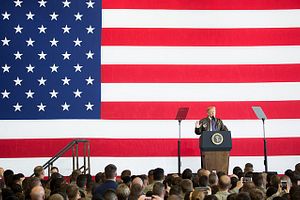Politics in the United States has been a global spectacle since January 2017, but it will be nothing compared with what’s to come.
Surprising few of his critics, Trump has conflated his personal political interests with those of the United States, using the power of his office to call on foreign countries to investigate his political opponents.
Though the spark that lit the fuse for impeachment was a remarkable whistleblower complaint regarding the president’s improper conduct with his Ukrainian counterpart Volodymyr Zelensky, more and more evidence is emerging of wrongdoing. The dam may be set to burst, drowning out the administration’s various policy agendas as survival becomes the sole objective.
Aside from presidents Richard Nixon and Bill Clinton, the only other precedent – perhaps most analogous to Trump’s case – was that of Andrew Johnson.
Nixon, with his political support vanished, resigned before a near-assured impeachment could formally take place. Clinton, though impeached by the House, survived adjudication by the U.S. Senate. Johnson, the 17th U.S. president in the aftermath of the civil war, also survived by a razor’s edge in the Senate, but his political popularity was destroyed to the point that he failed to win the support of his own party for a second term.
What has largely been true of impeachment proceedings to date has been their marginal impact on foreign policy. Nixon, who resigned before the conclusion of proceedings, maintained the course in Vietnam. Clinton, who saw the House vote on his impeachment, largely also kept his foreign policy on track. Trump, though only enduring an inquiry at the moment, is unlikely to stick to precedent.
The official Chinese response has been to emphasise non-interference in internal American affairs, but the president is clearly coming unhinged.
American adversaries like North Korea, meanwhile, appear determined to take their chances diplomatically, seeing Trump as a weakened target, more prone to making concessions than ever.
In this environment, the North Koreans may see their best chance at getting whatever they would like from the United States. That, however, might not be a wise calculation. Trump, more so than ever, may succumb to his basest instincts on foreign policy matters. Self-interest and unpredictability might intensify as a result.
Especially as 2020 approaches and impeachment and electoral survival emerge as dual threats, Trump may seek to lash out. On North Korea, that means a return to the days of “fire and fury” is just as likely as capitulation to Pyongyang’s demands.
For China, the best-case scenario would be that a distracted White House simply loses interest in the trade war. That, however, may be a bad bet. For Trump’s political base, an intensified trade war may be just what’s called for at this politically vulnerable moment.
The president has proven himself risk-acceptant and prone to never second-guess his instincts. Under the stresses of impeachment, Trump may recede into a darker version of himself, escalating ongoing disputes with China, North Korea, Iran and even American allies.
All of this is to say that we shouldn’t try to predict the fundamentally chaotic pathway of the Trump White House. Now under siege politically more than ever, there’s no telling how the president may move on critical foreign policy matters.
This article first appeared in the South China Morning Post. It is republished here with kind permission.

































